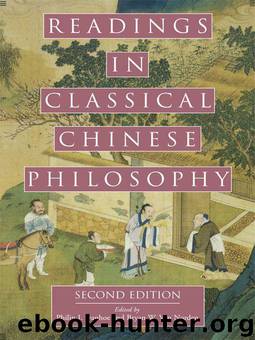Readings in Classical Chinese Philosophy by Van Norden Bryan W.; Ivanhoe Philip J

Author:Van Norden, Bryan W.; Ivanhoe, Philip J.
Language: eng
Format: mobi
ISBN: 9780872207813
Publisher: Hackett Publishing Co.
Published: 2011-01-20T15:00:00+00:00
CHAPTER FIVE
ZHUANGZI
Introduction
Little is known of Zhuangzi beyond what we can gather from the book named after him. Much of the book, however, is unapologetically fictional, so the stories it tells about him provide us more insight into his persona than into the historical facts of his life. We know from external sources that his friend Huizi served in the court of King Hui of Liang (390–319 B.C.E.), which places Zhuangzi in the end of the fourth century B.C.E. The version of the text we have was assembled around 300 C.E. and is widely agreed to be the work of multiple authors. Though some passages seem to have been written by Zhuangzi, the book must initially have been compiled by his students and then supplemented by later contributors and editors. The following selections are drawn primarily from what scholars generally recognize as the earliest portions of the text, which were either written or inspired by Zhuangzi himself Zhuangzi has a huge vocabulary, draws freely from history and mythology, and is equally at home writing poetry, logical analyses, dialogue, and narrative. His references to Kongzi, Laozi, and the Mohists demonstrate that he was familiar with their ideas, though the absence of quotations leaves uncertain whether he had access to the same texts we do. Huizi, who argued against the possibility of distinguishing one thing from another, is known to have debated one of Mengzi’s students. So Zhuangzi must at least have heard about Mengzi’s ideas, though he never mentions him by name.
Zhuangzi does not present his ideas systematically or define his central terms. But he regularly speaks of tian , “Heaven,” as the highest ideal for all things. He contrasts tian, which could also be translated as “nature,” to ren “people” or “humanity.” The human, for Zhuangzi, includes everything from concrete activities that interfere with nature, such as the mutilation of criminals, to abstract ideas, such as shilfei , “right and wrong,” that people project onto the world. Zhuangzi also speaks of dao , “the Way,” which encompasses both the Way the world is and the way for people to live in it. Though he believes there is a way, he is skeptical of our ability to learn much about it through words or thinking. In fact, he attacks thinking in order to make room, instead, for experience and intuition. Sometimes his attacks are direct, with arguments illustrating the limitations of language, sometimes indirect, with strange stories having no obvious moral or hero. Rather than delivering a message, the Zhuangzi seems to go out of its way to defy understanding. In this sense, though the stories are often fantastic, the book is meant to offer a realistic lesson in the uselessness of trying to figure out life. Thinking and talking have a place: Zhuangzi does a lot of both of them. The challenge is to harmonize thinking and talking with the other, incomprehensible aspects life.
In the second century B.C.E., the historian Sima Qian classified Zhuangzi as a founding member of the Daoist school, rather than as a Confucian or a Mohist.
Download
This site does not store any files on its server. We only index and link to content provided by other sites. Please contact the content providers to delete copyright contents if any and email us, we'll remove relevant links or contents immediately.
| African | Asian |
| Australia & Oceania | Canadian |
| Caribbean & Latin American | European |
| Jewish | Middle Eastern |
| Russian |
The Hating Game by Sally Thorne(18715)
The Universe of Us by Lang Leav(14828)
Sad Girls by Lang Leav(13907)
The Lover by Duras Marguerite(7585)
Smoke & Mirrors by Michael Faudet(5935)
The Rosie Project by Graeme Simsion(5837)
Big Little Lies by Liane Moriarty(5512)
The Shadow Of The Wind by Carlos Ruiz Zafón(5428)
The Poppy War by R. F. Kuang(5357)
Memories by Lang Leav(4570)
An Echo of Things to Come by James Islington(4562)
What Alice Forgot by Liane Moriarty(4429)
From Sand and Ash by Amy Harmon(4194)
The Poetry of Pablo Neruda by Pablo Neruda(3815)
The Tattooist of Auschwitz by Heather Morris(3650)
Ficciones by Jorge Luis Borges(3366)
Guild Hunters Novels 1-4 by Nalini Singh(3248)
The Rosie Effect by Graeme Simsion(3207)
THE ONE YOU CANNOT HAVE by Shenoy Preeti(3161)
